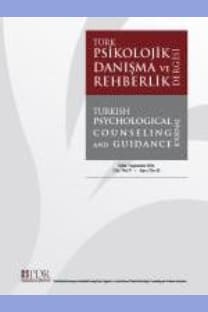Investigation of the Relationship between University Students' Perception of Coping with Trauma and Self-Compassion and Life Stress by Mixed Method
Investigation of the Relationship between University Students' Perception of Coping with Trauma and Self-Compassion and Life Stress by Mixed Method
Trauma, Coping with Trauma, Self-Compassion Life Stress, PACT,
___
- Allison, P. D. (1999). Multiple regression: A primer. Pine Forge Press.
- Arı, E. ve Cesur Soysal, G. (2019). Travma ile başa çıkabilme algısı ölçeğinin (TBÇA) Türkçeye uyarlanması, geçerlik ve güvenirlik çalışması. Klinik Psikoloji Dergisi, 3(1), 17-25. https://doi.org/10.5455/kpd.2602443806062019m000007
- Bahar, H. H. (2019). Sınıf öğretmen adaylarında akademik öz-yeterlik algısının akademik başarıyı yordama gücü. Ilkogretim Online, 18(1), 149-157. https://core.ac.uk/download/pdf/230035647.pdf adresinden erişildi.
- Bartholomew, T. T., Badura-Brack, A. S., Leak, G. K., Hearley, A. R. ve McDermott, T. J. (2017). Perceived ability to cope with trauma among US Combat veterans. Military Psychology, 29(3), 165-176. https://doi.org/10.1037/mil0000150
- Bonanno, G. A., Pat-Horenczyk, R. ve Noll, J. (2011). Coping flexibility and trauma: The Perceived Ability to Cope With Trauma (PACT) scale. Psychological Trauma: Theory, Research, Practice and Policy, 3(2), 117. https://doi.org/10.1037/a0020921
- Büyüköztürk, Ş., Çakmak, E., Akgün, Ö. E., Karadeniz, Ş. ve Demirel, F. (2019). Eğitimde bilimsel araştırma yöntemleri. Ankara: Pegem Yayıncılık.
- Calhoun, L. G. ve Tedeschi, R. G. (1998). Posttraumatic growth: Future directions. Posttraumatic growth: Positive Changes in the Aftermath of Crisis, 215-238. https://doi.org/10.5923/j.ijpbs.20160603.03
- Canan, S. (2015). Kimsenin bilemeyeceği şeyler. İstanbul: Tuti Kitap.
- Cleophas, T. J., Zwinderman, A. H. (2015). SPSS for Starters and 2nd Levelers.
- Doğan, F. Z. (2021). Üniversite Öğrencilerinin Okupasyonel Dengesi ile Stres, Stres Karşısındaki Tepkileri ve Başa Çıkma Tutumları Arasındaki İlişkinin İncelenmesi (Yayımlanmamış Yüksek Lisans Tezi). Hacettepe Üniversitesi, Sağlık Bilimleri Fakültesi, Ankara.
- Germer, C. K. ve Neff, K. D. (2015). Cultivating self-compassion in trauma survivors. Mindfulness-oriented interventions for trauma: Integrating Contemplative Practices, 43-58. https://self-compassion.org/wp-content/uploads/2015/08/Germer.Neff_.Trauma.pdf adresinden erişildi.
- Hiraoka, R., Meyer, E. C., Kimbrel, N. A., DeBeer, B. B., Gulliver, S. B., & Morissette, S. B. (2015). Self‐compassion as a prospective predictor of PTSD symptom severity among trauma‐exposed US Iraq and Afghanistan war veterans. Journal of traumatic stress, 28(2), 127-133. https://doi.org/10.1002/jts.21995
- Johnson, B. & Christensen, L. (2007). Educational research: Quantitative, qualitative and mixed approaches, 3rd Ed. Thousand Oaks, CA: Sage. http://www.sagepub.com/bjohnsonstudy/index.htm adresinden erişilmiştir.
- Karaoğlu, M., Erzi S. (2019). Yeme tutumları ve travmatik yaşantılar: Öz şefkat ve duygu düzenlemenin aracı rolü. Kıbrıs Türk Psikiyatri ve Psikoloji Dergisi, 1(3), 145-151. https://doi.org/10.35365/ctjpp.19.1.18
- Kardaş, F. (2013). Van depremini yaşayan üniversite öğrencilerinin travma sonrası stres travma sonrası büyüme ve umutsuzluk düzeylerinin çeşitli değişkenler açısından incelenmesi (Yayımlanmamış Yüksek Lisans Tezi). Yüzüncü Yıl Üniversitesi, Eğitim Bilimleri Enstitüsü, Van.
- Knowles, L. M., O'Connor, M. F. (2015). Coping flexibility, forward focus and trauma focus in older widows and widowers. Bereavement Care, 34(1), 17-23. https://doi.org/10.1080/02682621.2015.1028200
- Krohne, H. W. (2002). Stress and coping theories. International Encyclopedia of the Social Behavioral Sceinces, 22, 15163-15170. https://commonweb.unifr.ch/artsdean/pub/gestens/f/as/files/4660/18222_105619.pdf adresinden erişildi.
- Lazarus, R. S. (1993). From psychological stress to the emotions: A history of changing outlooks. Annual Review of Psychology, 44(1), 1-22. Lee, D. A., Scragg, P. ve Turner, S. (2001). The role of shame and guilt in traumatic events: A clinical model of shame‐based and guilt‐based PTSD. British Journal of Medical Psychology, 74(4), 451-466. https://doi.org/10.1348/000711201161109
- Neff, K. D., Hsieh, Y. P. ve Dejitterat, K. (2005). Self-compassion, achievement goals, and coping with academic failure. Self and Identity, 4(3), 263-287. https://doi.org/10.1080/13576500444000317
- Okay, D. (2017). The psychological impacts of indirect exposure to ongoing terrorist attacks on a group of Turkish university students: A qualitative analysis (Yayımlanmamış Yüksek Lisans Tezi). Ortadoğu Teknik Üniversitesi, Sosyal Bilimler Enstitüsü, Ankara.
- Özyeşil, Z. (2011).Üniversite öğrencilerinin öz-anlayış düzeylerinin bilinçli farkındalık kişilik özellikleri ve bazı değişkenler açısından incelenmesi (Yayımlanmış Doktora Tezi). Selçuk Üniversitesi, Eğitim Bilimleri Enstitüsü, Konya.
- Parkes, C. M. (2014). Responses to terrorism that feed cycles of violence: A model. In Responses to terrorism. New York, NY: Routledge.
- Saita, E., Acquati, C., Fenaroli, V., Zuliani, C. ve Bonanno, G. A. (2017). A confirmatory factor analysis of the Perceived Ability to Cope with Trauma (PACT) scale. TPM: Testing, Psychometrics, Methodology in Applied Psychology, 24(2), 255-268. http://www.tpmap.org/wp-content/uploads/2017/06/24.2.5.pdf adresinden erişildi.
- Scoglio, A. A., Rudat, D. A., Garvert, D., Jarmolowski, M., Jackson, C. ve Herman, J. L. (2015). Self-compassion and responses to trauma: The role of emotion regulation. Journal of Interpersonal Violence, 33(13), 2016-2036. https://doi.org/10.1177/0886260515622296
- Seven Gürçen, M. (2022), Süreğen ve kitlesel bir travma olarak covıd-19: üniversite öğrencilerinde covıd-19 korkusunun algılanan stres ve travma ile başa çıkabilme algısını yordamasında yaşantısal kaçınmanın aracı rolü (Yayımlanmamış Yüksek Lisans Tezi). Muğla Sıtkı Koçman Üniversitesi, Eğitim Bilimleri Enstitüsü, Muğla.
- Tabachnick, B. G., ve Fidell, L. S. (2013). Using Multivariate Statistics (6th ed.). Boston, MA: Pearson.
- Thompson, B. L., & Waltz, J. (2008). Self‐compassion and PTSD symptom severity. Journal of Traumatic Stress: Official Publication of the International Society for Traumatic Stress Studies, 21(6), 556-558. https://doi.org/10.1002/jts.20374
- Uzel, T. (2020). Depresyon hastalarında çocukluk çağı travmaları, başa çıkma tutumları, intihar düşüncesinin düzeyi ve aralarındaki ilişkinin incelenmesi (Yayımlanmamış Yüksek Lisans Tezi). Nevşehir Hacı Bektaş Veli Üniversitesi, Fen Bilimleri Enstitüsü, Nevşehir.
- Uzunsakal, E. ve Yıldız, D. (2018). Alan araştırmalarında güvenilirlik testlerinin karşılaştırılması ve tarımsal veriler üzerine bir uygulama. Uygulamalı Sosyal Bilimler Dergisi, 2(1), 14-28.
- Valdez, C. E., Lilly ve M. M. (2016). Self-compassion and trauma processing outcomes among victims of violence. Mindfulness, 7(2), 329-339. https://doi.org/10.1007/s12671-015-0442-3Winders, S. J., Murphy, O., Looney, K. ve O'Reilly, G. (2020). Self‐compassion, trauma, and posttraumatic stress disorder: A systematic review. Clinical Psychology & Psychotherapy, 27(3), 300-329. https://doi.org/10.1002/cpp.2429
- ISSN: 1302-1370
- Yayın Aralığı: 4
- Başlangıç: 1990
- Yayıncı: -
Kübra ÇETİN, Süleyman Barbaros YALÇIN
Evaluation in the Psychological Help: Psychological Group Counseling Experience from Members' Eyes
Taşkın YILDIRIM, Metin ÇELİK, Birkan GÜNEŞ
Elif ÖZEN, Nihal YENİAD, Bengu BORKAN
Examination of the factors affecting the adjustment of the children of divorced families
A Phenomenological Research on Creativity in the Psychological Counseling Process
Osman Nejat AKFIRAT, Fevziye DOLUNAY CUĞ, Yıldız ÖZTAN ULUSOY
Ezginur ÇELİK, Sinem BALTACI, Neslihan YAMAN
